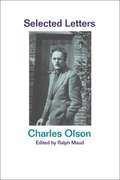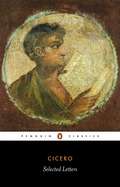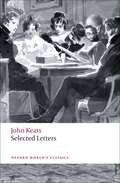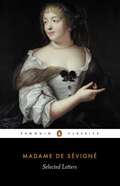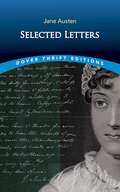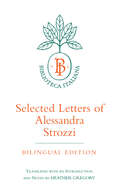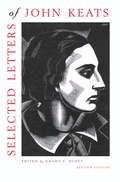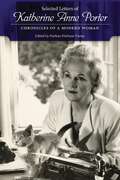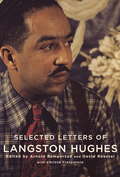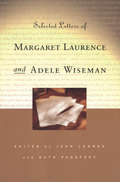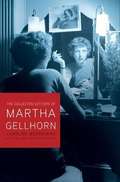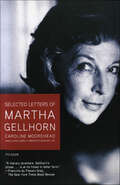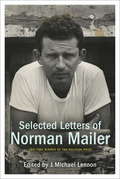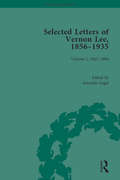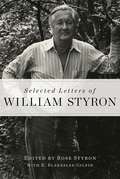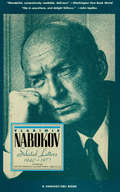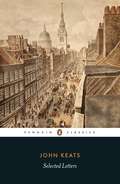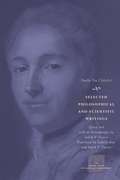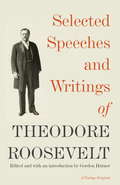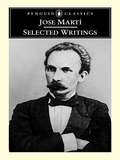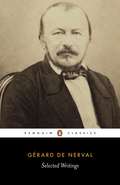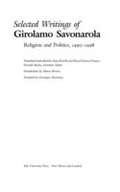- Table View
- List View
Selected Letters
by Charles OlsonIn this volume, nearly 200 letters, selected from a known 3,000, demonstrate the wide range of Olson's interests and the depth of his concern for the future which includes letters to friends and loved ones, job and grant applications, letters of recommendation, and Black Mountain College business letters, as well as correspondence illuminating Olson's poetics. The letters which span from 1931 to his death in 1970 portrays a fascinating picture of this complex poet and thinker.
Selected Letters
by CiceroThe greatest orator in Roman history, Marcus Tullius Cicero remained one of the republic's chief supporters throughout his life, guided by profound political beliefs that illuminated his correspondence with both close friends and powerful aristocrats. A chronicle of a crumbling civilization during the era when the republic disintegrated and was replaced by despotism, his Letters portray a world dominated by characters who have since acquired almost mythic status - including Pompey, Caesar, Brutus, Cassius, and Mark Antony. Whether describing the vagaries of war, the collapse of Roman society, his beloved republic, or his own personal domestic dramas, all compellingly reflect the complex personality of an honourable and selfless man whose refusal to compromise ultimately cost him his life.
Selected Letters
by Isobel Grundy Mary MontaguA revised selection of Lady Montagu's letters. Besides presenting a vivid picture of manners in a picturesque age, they contain a unique series of impressions from foreign courts seldom visited and nowhere else so intimately described. Lady Mary was the wife of a popular ambassador and, wielding the charm of a strong personality, was enabled to see and hear many things of which the ordinary traveler, or resident abroad, knew-and knows-little or nothing. Originally written, for the most part, to her sisters, her daughter, or to very intimate friends, her Letters are unusually detailed and frank. She was a keen observer, not superior to the love of gossip with a quick eye for the telling features of a story or situation, and an easy, effective style.
Selected Letters
by John Keats Jon Mee Robert Gittings'Do you not see how necessary a World of Pains and troubles is to school an Intelligence and make it a soul?' Keats's letters have long been regarded as an extraordinary record of poetic development and soulmaking. They represent one of the most sustained reflections on the poet's art we have from any of the major English poets. Yet quite apart from the light they throw on the poetry, they are great works of literature in their own right. Written with gusto and occasionally painful candour, they show a powerful intelligence struggling to come to terms with its own mortality. Sometimes bitterly jealous in love and socially and financially insecure, at others playful and confident of his own greatness, Keats interweaves his personal plight with the history of a Britain emerging from the long years of the Napoleonic Wars into a world of political unrest, profound social change, and commercial expansion. This selection of 170 letters, written between 1816 and 1820, includes a new introduction and notes by Jon Mee explaining both the personal and political contexts that brought them to life.
Selected Letters
by Madame SevigneOne of the world's greatest correspondents, Madame de Sévigné (1626-96) paints an extraordinarily vivid picture of France at the time of Louis XIV, in eloquent letters written throughout her life to family and friends. A significant figure in French society and literary circles, whose close friends included Madame de La Fayette and La Rochefoucauld, she reflected on both significant historical events and personal issues, and in this selection of the most significant letters, spanning almost fifty years, she is by turns humorous and melancholic, profound and superficial. Whether describing the new plays of Racine and Molière, speculating on court scandals - including the intrigues of the King's mistresses - or relating her own family concerns, Madame de Sévigné provides throughout an intriguing portrait of the lost age of Le Roi Soleil.
Selected Letters (Dover Thrift Editions)
by Jane AustenOne of England's most popular novelists, Jane Austen wrote about life amid the gentry of the late eighteenth and early nineteenth centuries. In her fiction, Austen analyzed and satirized her world, particularly the expectations and duties of women in an unequal society. She was also a prolific correspondent, and her intimate, gossipy letters to family and friends offer unique insights into her life and work.
Selected Letters of Alessandra Strozzi, Bilingual edition (Biblioteca Italiana #9)
by Alessandra StrozziThe letters of Alessandra Strozzi provide a vivid and spirited portrayal of life in fifteenth-century Florence. Among the richest autobiographical materials to survive from the Italian Renaissance, the letters reveal a woman who fought stubbornly to preserve her family's property and position in adverse circumstances, and who was an acute observer of Medicean society. Her letters speak of political and social status, of the concept of honor, and of the harshness of life, including the plague and the loss of children. They are also a guide to Alessandra's inner life over a period of twenty-three years, revealing the pain and sorrow, and, more rarely, the joy and triumph, with which she responded to the events unfolding around her.This edition includes translations, in full or in part, of 35 of the 73 extant letters. The selections carry forward the story of Alessandra's life and illustrate the range of attitudes, concerns, and activities which were characteristic of their author.
Selected Letters of John Keats: Based on texts of Hyder Edward Rollins, Revised Edition
by John KeatsThe letters of John Keats are, T. S. Eliot remarked, "what letters ought to be; the fine things come in unexpectedly, neither introduced nor shown out, but between trifle and trifle." This new edition, which features four rediscovered letters, three of which are being published here for the first time, affords readers the pleasure of the poet's "trifles" as well as the surprise of his most famous ideas emerging unpredictably. Unlike other editions, this selection includes letters to Keats and among his friends, lending greater perspective to an epistolary portrait of the poet. It also offers a revealing look at his "posthumous existence," the period of Keats's illness in Italy, painstakingly recorded in a series of moving letters by Keats's deathbed companion, Joseph Severn. Other letters by Dr. James Clark, Percy Bysshe Shelley, and Richard Woodhouse--omitted from other selections of Keats's letters--offer valuable additional testimony concerning Keats the man. Edited for greater readability, with annotations reduced and punctuation and spelling judiciously modernized, this selection recreates the spontaneity with which these letters were originally written.
Selected Letters of Katherine Anne Porter: Chronicles of a Modern Woman
by Darlene Harbour UnrueKatherine Anne Porter (1890–1980) produced a relatively small body of fiction, but she wrote thousands and thousands of letters. The present selection of 135 unexpurgated letters, written to seventy-four different persons, begins with a 1916 letter written from a tuberculosis sanatorium in Texas and ends with a 1979 letter dictated to an unnamed nursing-home attendant in Maryland. Different from any previous selection, this body of letters does not omit Porter's frank criticism of fellow writers and spans her entire life. Within that circumscription is the chronicle of Porter, a twentieth-century woman searching for love while she struggles to become the writer who she is sure she can be. Porter's letters vividly showcase the twentieth century as the writer observes it from her historical vantage points—tuberculosis sanatoria and the influenza pandemic of 1918; the leftist community in Greenwich Village in the 1920s; the Mexican cultural revolution of the 1920s and early 1930s; the expatriate community in Paris in the 1930s; the rise of Nazism in Europe between the World Wars; the Second World War and its concomitant suppression of civil liberties; Hollywood and the university circuit as a haven for financially strapped writers in the 1940s and 1950s; the Cold War and its competition for supremacy in space; the women's rights and the civil rights movements; and the evolution and demise of literary modernism.
Selected Letters of Langston Hughes
by Langston Hughes Arnold Rampersad David Roessel Christa FratantoroThis is the first comprehensive selection from the correspondence of the iconic and beloved Langston Hughes. It offers a life in letters that showcases his many struggles as well as his memorable achievements. Arranged by decade and linked by expert commentary, the volume guides us through Hughes's journey in all its aspects: personal, political, practical, and--above all--literary. His letters range from those written to family members, notably his father (who opposed Langston's literary ambitions), and to friends, fellow artists, critics, and readers who sought him out by mail. These figures include personalities such as Carl Van Vechten, Blanche Knopf, Zora Neale Hurston, Arna Bontemps, Vachel Lindsay, Ezra Pound, Richard Wright, Kurt Weill, Carl Sandburg, Gwendolyn Brooks, James Baldwin, Martin Luther King, Jr., Alice Walker, Amiri Baraka, and Muhammad Ali. The letters tell the story of a determined poet precociously finding his mature voice; struggling to realize his literary goals in an environment generally hostile to blacks; reaching out bravely to the young and challenging them to aspire beyond the bonds of segregation; using his artistic prestige to serve the disenfranchised and the cause of social justice; irrepressibly laughing at the world despite its quirks and humiliations. Venturing bravely on what he called the "big sea" of life, Hughes made his way forward always aware that his only hope of self-fulfillment and a sense of personal integrity lay in diligently pursuing his literary vocation. Hughes's voice in these pages, enhanced by photographs and quotations from his poetry, allows us to know him intimately and gives us an unusually rich picture of this generous, visionary, gratifyingly good man who was also a genius of modern American letters.From the Hardcover edition.
Selected Letters of Margaret Laurence and Adele Wiseman
by John Lennox Ruth PanofskyOver a period of forty years, from 1947 to 1986, Margaret Laurence and Adele Wiseman wrote to each other constantly. The topics they wrote about were as wide-ranging as their interests and experiences, and their correspondence encompassed many of the varied events of their lives. Laurence's letters - of which far more are extant than Wisman's - reveal much about the impact of her years in Africa, motherhood, her anxieties and insecurities, and her developement as a writer. Wiseman, whose literary success came early in her career, provided a sympathetic ear and constant encouragement to Laurence.The editors' selection has been directed by an interest in these women as friends and writers. Their experiences in the publishing world offer an engaging perspective on literary apprenticeship, rejection, and success. The letters reveal the important roles both women played in the buoyant cultural nationalism of the 1960s and 1970s. This valuable collection of previously unpublished primary material will be essential to scholars working on Canadian literature and of great interest to the general reading. The introduction contextualizes the correspondence and the annotations to the letters help to clarify the text. The Laurence-Wiseman letters offer a fascinating glimpse into the lives and friendship of two remarkable women whose personal correspondence was written with verve, compassion, and wit.
Selected Letters of Martha Gellhorn
by Caroline Moorehead Martha GellhornThe first collected letters of this defining figure of the twentieth-century Martha Gellhorn's heroic career as a reporter brought her to the front lines of virtually every significant international conflict between the Spanish Civil War and the end of the Cold War.
Selected Letters of Martha Gellhorn
by Caroline Moorehead Martha Gellhorn“A literary landmark” that spans the author’s complex life and career—“Gellhorn’s prose . . . is at its finest in the letter form” (Francine du Plessix Gray, The New York Times Book Review).Martha Gellhorn’s reporting brought her to the front lines of virtually every significant conflict from the Spanish Civil War to the end of the cold war. While Gellhorn’s wartime dispatches rank among the best of the twentieth century, her personal letters are their equal: as vivid and fascinating as her reporting was trenchant.Gellhorn’s correspondence introduces us to the woman behind the often-inscrutable journalist, chronicling her friendships with world-famous luminaries as well as her tempestuous marriage to Ernest Hemingway.Caroline Moorehead, Gellhorn’s critically acclaimed biographer, was granted exclusive access to the letters. This expertly edited volume contextualizes Gellhorn’s correspondence within the arc of her entire life; the result is an intimate portrait of one of the most accomplished women of modern times.A Washington Post Best Nonfiction Book of 2006A Slate Best Book of 2006A Kansas City Star Noteworthy Book of 2006
Selected Letters of Norman Mailer
by Norman Mailer J. Michael LennonA genuine literary event--an illuminating collection of correspondence from one of the most acclaimed American writers of all time Over the course of a nearly sixty-year career, Norman Mailer wrote more than 30 novels, essay collections, and nonfiction books. Yet nowhere was he more prolific--or more exposed--than in his letters. All told, Mailer crafted more than 45,000 pieces of correspondence (approximately 20 million words), many of them deeply personal, keeping a copy of almost every one. Now the best of these are published--most for the first time--in one remarkable volume that spans seven decades and, it seems, several lifetimes. Together they form a stunning autobiographical portrait of one of the most original, provocative, and outspoken public intellectuals of the twentieth century. Compiled by Mailer's authorized biographer, J. Michael Lennon, and organized by decade, Selected Letters of Norman Mailer features the most fascinating of Mailer's missives from 1940 to 2007--letters to his family and friends, to fans and fellow writers (including Truman Capote, James Baldwin, and Philip Roth), to political figures from Henry Kissinger to Bill and Hillary Clinton, and to such cultural icons as John Lennon, Marlon Brando, and even Monica Lewinsky. Here is Mailer the precocious Harvard undergraduate, writing home to his parents for the first time and worrying that his acceptances by literary magazines were "all happening too easy." Here, too, is Mailer the soldier, confronting the violence of war in the Pacific, which would become the subject of his masterly debut novel, The Naked and the Dead: "[I'm] amazed how casually it fits into . . . daily life, how very unhorrible it all is." Mailer the international celebrity pledges to William Styron, "I'm going to write every day, and like Lot's Wife I'm consigning myself to a pillar of salt if I dare to look back," while the 1980s Mailer agonizes over the fallout from his ill-fated friendship with Jack Henry Abbott, the murderer who became his literary protégé. ("The continuation of our relationship was depressing for both of us," he confesses to Joyce Carol Oates.) At last, he finds domestic--and erotic--bliss in the arms of his sixth wife, Norris Church ("We bounce into each other like sunlight"). Whether he is reflecting on the Kennedy assassination, assessing the merits of authors from Fitzgerald to Proust, or threatening to pummel William Styron, the brilliant, pugnacious Norman Mailer comes alive again in these letters. The myriad faces of this artist and activist, lover and fighter, public figure and private man, are laid bare in this collection as never before.
Selected Letters of Vernon Lee, 1856 - 1935: Volume I, 1865-1884 (The Pickering Masters)
by Amanda GagelVernon Lee was the pen name of Violet Paget (1856–1935) – a prolific author best known for her supernatural fiction, her support of the Aesthetic Movement and her radical polemics. She was also an active letter writer whose correspondents include many well-known figures in fin de siècle intellectual circles across Europe. However, until now no attempt has been made to make these letters widely available in their complete form. This multi-volume scholarly edition presents a comprehensive selection of her English, French, Italian, and German correspondence — compiled from more than 30 archives worldwide — that reflect her wide variety of interests and occupations as a Woman of Letters and contributor to scholarship and political activism. Letters written in a language other than English have been expertly translated by scholars Sophie Geoffroy (from the French), Crystal Hall (from the Italian), and Christa Zorn (from the German). The edition focuses on those letters concerning the writing, ideas and aesthetics that influenced Lee’s articles, books and stories. Full transcriptions of some 500 letters, covering the years 1856-1935, are arranged in chronological order along with a newly written introduction that explains their context and identifies the recipients, friends and colleagues mentioned. Since scholarship on Lee’s critical and creative output is still in the beginning stages, these letters will serve a purpose to students and researchers in a number of academic fields. In this first volume, tracing the years 1856– 1884, the assembled letters cover the beginnings of her career, encompassing her first publication, visits to London and encounters with some of the important artistic figures of the time. As her career begins to blossom, the letters also reflect the expansion of her subject matter from cultural studies and art history to novels and aesthetic philosophy. Correspondents include Lee’s parents, Matilda and Henry Paget; her brother the poet Eugene Lee-Hamilton; English poet Mary Robinson; English authors Henrietta Jenkin and Linda Villari; and Italian writers Enrico Nencioni, Mario Pratesi, and Angelo De Gubernatis, among others.
Selected Letters of William Styron
by William Styron Rose Styron R. Blakeslee GilpinIn 1950, at the age of twenty-four, William Clark Styron, Jr., wrote to his mentor, Professor William Blackburn of Duke University. The young writer was struggling with his first novel, Lie Down in Darkness, and he was nervous about whether his "strain and toil" would amount to anything. "When I mature and broaden," Styron told Blackburn, "I expect to use the language on as exalted and elevated a level as I can sustain. I believe that a writer should accommodate language to his own peculiar personality, and mine wants to use great words, evocative words, when the situation demands them." In February 1952, Styron was awarded the Prix de Rome of the American Academy of Arts and Letters, which crowned him a literary star. In Europe, Styron met and married Rose Burgunder, and found himself immersed in a new generation of expatriate writers. His relationships with George Plimpton and Peter Matthiessen culminated in Styron introducing the debut issue of The Paris Review. Literary critic Alfred Kazin described him as one of the postwar "super-egotists" who helped transform American letters. His controversial The Confessions of Nat Turner won the 1968 Pulitzer Prize, while Sophie's Choice was awarded the 1980 National Book Award, and Darkness Visible, Styron's groundbreaking recounting of his ordeal with depression, was not only a literary triumph, but became a landmark in the field. Part and parcel of Styron's literary ascendance were his friendships with Norman Mailer, James Baldwin, John and Jackie Kennedy, Arthur Miller, James Jones, Carlos Fuentes, Wallace Stegner, Robert Penn Warren, Philip Roth, C. Vann Woodward, and many of the other leading writers and intellectuals of the second half of the twentieth century. This incredible volume takes readers on an American journey from FDR to George W. Bush through the trenchant observations of one of the country's greatest writers. Not only will readers take pleasure in William Styron's correspondence with and commentary about the people and events that made the past century such a momentous and transformative time, they will also share the writer's private meditations on the very art of writing.Advance praise for Selected Letters of William Styron "I first encountered Bill Styron when, at twenty, I read The Confessions of Nat Turner. Hillary and I became friends with Bill and Rose early in my presidency, but I continued to read him, fascinated by the man and his work, his triumphs and troubles, the brilliant lights and dark corners of his amazing mind. These letters, carefully and lovingly selected by Rose, offer real insight into both the great writer and the good man."--President Bill Clinton"The Bill Styron revealed in these letters is altogether the Bill Styron who was a dear friend and esteemed colleague to me for close to fifty years. The humor, the generosity, the loyalty, the self-awareness, the commitment to literature, the openness, the candor about matters closest to him--all are on display in this superb selection of his correspondence. The directness in the artful sentences is such that I felt his beguiling presence all the while that I was enjoying one letter after another."--Philip Roth "Bill Styron's letters were never envisioned, far less composed, as part of the Styron oeuvre, yet that is what they turn out to be. Brilliant, passionate, eloquent, insightful, moving, dirty-minded, indignant, and hilarious, they accumulate power in the reading, becoming in themselves a work of literature."--Peter MatthiessenFrom the Hardcover edition.
Selected Letters, 1940–1977: Selected Letters 1940-1977 (The\penguin Vladimir Nabokov Hardback Collection #929)
by Vladimir Nabokov&“Wonderful, compulsively readable, delicious&” personal correspondences, spanning decades in the life and literary career of the author of Lolita (The Washington Post Book World). An icon of twentieth-century literature, Vladimir Nabokov was a novelist, poet, and playwright, whose personal life was a fascinating story in itself. This collection of more than four hundred letters chronicles the author&’s career, recording his struggles in the publishing world, the battles over Lolita, and his relationship with his wife, among other subjects, and gives a surprising look at the personality behind the creator of such classics as Pale Fire and Pnin. &“Dip in anywhere, and delight follows.&” —John Updike
Selected Letters: The Complete Poems And Selected Letters (Collins Classics Ser.)
by John Keats'I am certain of nothing but the holiness of the heart's affections, and the truth of imagination' - Keats, in a letter to his friend Benjamin Bailey in November 1817.In a period of great letter-writing, Keats's letters are outstanding. They begin in summer 1816, as he approached his twenty-first birthday, and were written over the next four years until his early death. Viewed together, they give the fullest and most poignant record we have of Keats's ambitions and hopes as a poet, his life as a literary man about town, his close relationship with his brothers and young sister, and, later, his passionate, jealous and frustrated love for Fanny Brawne.Keats enclosed many of his poems with his letters, and read together, they offer an incomparable insight into his creative process and development as a poet. This major new edition edited by Professor John Barnard includes an introduction and notes, as well as a map of Keats's Scottish walking tour and reproductions of his letters.John Keats was born in October 1795. His Poems appeared in 1817, while Endymion was published in 1818, both to mixed reviews. In 1819 he wrote The Eve of St Agnes, La Belle Dame sans Merci, the major odes, Lamia and the Fall of Hyperion. Keats was already unwell when preparing his 1820 volume for the press; by the time it appeared in July he was desperately ill. He died in Rome in 1821, in a rented apartment next to the Spanish Steps, at the age of twenty-five.John Barnard is Emeritus Professor of English Literature at the University of Leeds and has edited The Complete Poems of Keats for Penguin Classics.
Selected Philosophical And Scientific Writings (Jossey-bass Guides To Online Teaching And Learning)
by Judith P. Zinsser Isabelle Bour Emilie Du ChâteletThough most historians remember her as the mistress of Voltaire, Emilie Du Châtelet (1706–49) was an accomplished writer in her own right, who published multiple editions of her scientific writings during her lifetime, as well as a translation of Newton’s Principia Mathematica that is still the standard edition of that work in French. Had she been a man, her reputation as a member of the eighteenth-century French intellectual elite would have been assured. In the 1970s, feminist historians of science began the slow work of recovering Du Châtelet’s writings and her contributions to history and philosophy. For this edition, Judith P. Zinsser has selected key sections from Du Châtelet’s published and unpublished works, as well as related correspondence, part of her little-known critique of the Old and New Testaments, and a treatise on happiness that is a refreshingly uncensored piece of autobiography—making all of them available for the first time in English. The resulting volume will recover Châtelet’s place in the pantheon of French letters and culture.
Selected Poems of Gopalakrishna Adiga
by Sumatheendra NadigWorks, life and poems of Gopalakrishna Adiga.
Selected Poetry and Prose of Évariste Parny: In English Translation, with French Text (Texts and Translations #31)
by Françoise Lionnet Peter Low Blake SmithPraised by Voltaire and admired by Pushkin, Évariste Parny (1753-1814) was born on the island of Réunion, which is east of Madagascar, and educated in France. His life as a soldier and government administrator allowed him to travel to Brazil, Africa, and India. Though from the periphery of France's colonial empire, he ultimately became a member of the Académie Française. Despite his reaching that pinnacle of respectability, some of his poetry was banned after his death.This edition includes poems from the Poésies érotiques and Élégies, which established Parny's reputation; the Chansons madécasses ("Madagascar Songs"), which were influential in the development of the prose poem; five of his published letters, written in a mixture of prose and verse; the narrative poem Le Voyage de Céline; and selections from his sardonic, anticlerical later poetry. A substantial introduction discusses Parny's poetry in connection with its literary context and the themes of gender, race, and postcoloniality.
Selected Speeches and Writings of Theodore Roosevelt
by Theodore Roosevelt Gordon HutnerTheodore Roosevelt (1858-1919) was our most published president with an incredible output of writing including forty books, over a thousand articles, and countless speeches and letters. Collected here in one volume are examples of Roosevelt's voluminous writings over a dazzling array of topics. Organized by general categories, readers can sample writings on subjects as varied as the environment, the danger of professional sports; the famous charge of San Juan Hill, and Roosevelt's passion for literary criticism. From addresses and presidential messages on public policy and national ideals, to biography, to travel writing, to ecological concerns, to writings on hunting, to international politics and history, Roosevelt's talents and achievements as a writer went far beyond what we now expect of our public leaders. Roosevelt's legacy as one of the first progressive American politicians, his concerns about environmentalism, his internationalism, and his unflinching belief in the American character and destiny uncannily speak to the issues of our own day and can be found in the pages of this representative and judicious anthology of his work.
Selected Writings
by Esther Allen Roberto Gonzalez Echevarria Jose MartiJosé Martí (1853-1895) is the most renowned political and literary figure in the history of Cuba. A poet, essayist, orator, statesman, abolitionist, and the martyred revolutionary leader of Cuba's fight for independence from Spain, Martí lived in exile in New York for most of his adult life, earning his living as a foreign correspondent. Throughout the 1880s and early 1890s, Martí's were the eyes through which much of Latin America saw the United States. His impassioned, kaleidoscopic evocations of that period in U.S. history, the assassination of James Garfield, the opening of the Brooklyn Bridge, the execution of the Chicago anarchists, the lynching of the Italians in New Orleans, and much more, bring it rushing back to life. Organized chronologically, this collection begins with his early writings, including a thundering account of his political imprisonment in Cuba at age sixteen. The middle section focuses on his journalism, which offers an image of the United States in the nineteenth century, its way of life and system of government, that rivals anything written by de Tocqueville, Dickens, Trollope, or any other European commentator. Including generous selections of his poetry and private notebooks, the book concludes with his astonishing, hallucinatory final masterpiece, "War Diaries", never before translated into English.
Selected Writings
by Gerard de NervalPoet, visionary, short-story writer and autobiographer, Gérard de Nerval (1808-1855) explored the uncertain borderlines between dream and reality, irony and madness, autobiography and fiction with his groundbreaking writings. This comprehensive selection of his works includes 'Aurélia', the memoir of his madness; the haunting novella of love and memory 'Sylvie' (considered to be a masterpiece by Proust); the hermetic sonnets of 'The Chimeras'; as well as Nerval's experimental fictions and selections from his correspondence, which demonstrate his lucid awareness of how nineteenth-century psychiatry consigned his fertile imagination to the status of mental illness. Together these pieces confirm Nerval's place as a pioneering modernist, a precursor of the French Symbolists and a vital model for such writers as Marcel Proust, André Breton, Antonin Artaud and Michel Leiris.
Selected Writings of Girolamo Savonarola: Religion and Politics, 1490-1498
by Girolamo Savonarola Anne Borelli Maria Pastore PassaroFive hundred years after his death at the stake, Girolamo Savonarola remains one of the most fascinating figures of the Italian Renaissance. This wide-ranging collection, with an introduction by historian Alison Brown, includes translations of his sermons and treatises on pastoral ministry, prophecy, politics, and moral reform, as well as the correspondence with Alexander VI that led to Savonarola's silencing and excommunication. Also included are first-hand accounts of religio-civic festivities instigated by Savonarola and of his last moments. This collection demonstrates the remarkable extent of Savonarola's contributions to the religious, political, and aesthetic debates of the late fifteenth century.
